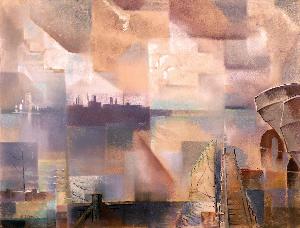Will Henry Stevens
Will Henry Stevens
Place: Vevay
Born: 1881
Death: 1949
Biography:
Will Henry Stevens was an American modernist painter and naturalist, known for his paintings and tonal pastels depicting the rural Southern landscape, abstractions of nature, and non-objective works. Born on November 28, 1881, in Vevay, Indiana, Stevens' artistic career spanned several decades, with his work being exhibited in numerous museums and galleries across the United States.
Early Life and Education
Stevens studied at the Cincinnati Art Academy for three years before leaving to begin working at the Rookwood Pottery as a painter/designer in 1904. During this time, he met his wife, Grace Hall, a fellow designer. In 1906, Stevens made his first visit to New York, where he studied at the Art Students League, although he was dissatisfied with the classroom style of William Merritt Chase and soon dropped out.
Artistic Career
Stevens' artistic career was marked by experimentation and innovation. He developed a pastel medium of his own invention, which allowed for greater freedom and creativity in his work. His reliance on drawing, with charcoal, pastel, and watercolor, led him to place greater importance on the graphic structure of his composition. This new direction also revived Stevens' earlier interest in Song painting, and its underlying philosophy of the artist as an extension of nature. Some of Stevens' notable works can be found at the Ogden Museum of Southern Art, the Museum of Fine Arts Boston, and the Smithsonian American Art Museum. His paintings are also part of the collections at the North Carolina Museum of Art and the Los Angeles County Museum of Art.
Innovations and Style
Stevens was an innovator in his field, and his work was characterized by its attention to detail, accuracy in observation, and the use of ordinary subjects. He was part of the Naturalism movement, which emphasized a scientific approach to art, focusing on the representation of everyday life and the rejection of idealization or romanticization. More information about the Naturalism movement can be found at The Naturalism Art Movement. Key aspects of Stevens' style include:
- Use of pastel medium and experimentation with new techniques
- Emphasis on graphic structure and composition
- Influence of Song painting and its underlying philosophy
- Ordinary subjects and attention to detail
Legacy
Will Henry Stevens' legacy can be seen in his contributions to the American modernist movement and his innovative approach to art. His work continues to be exhibited and admired in museums and galleries across the United States. For more information about Will Henry Stevens, visit Will Henry Stevens on Wikioo.org or Will Henry Stevens on Wikipedia.

